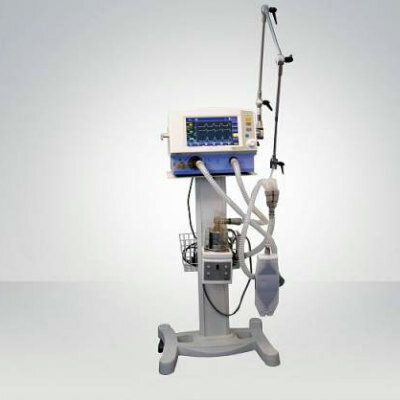SARS-Cov-2 Specific Antibody Responses in COVID-19 Patients
|
By HospiMedica International staff writers Posted on 30 Mar 2020 |

Image: Transmission electron micrograph of an isolate from a case of COVID-19, caused by the coronavirus SARS-CoV-2. The spherical viral particles, colorized blue, contain cross-sections through the viral genome, seen as black dots (Photo courtesy of Hannah A Bullock and Azaibi Tamin).
The rapid identification of the etiology and the sharing of the genetic sequence of the virus, followed by international collaborative efforts initiated due to the emergence of SARS-CoV-2 have led to the rapid availability of real-time PCR diagnostic assays that support the case ascertainment and tracking of the outbreak.
Validated serologic assays are crucial for patient contact tracing, identifying the viral reservoir hosts and for epidemiological studies. Epidemiological studies are urgently needed to help uncover the burden of disease, in particular, the rate of asymptomatic infections, and to get better estimates on morbidity and mortality.
An international team of scientists working with the Erasmus Medical Center (Rotterdam, the Netherlands) developed serological assays for the detection of SARS-CoV-2 neutralizing, spike- and nucleocapsid-specific antibodies. They used serum samples from patients with polymerase chain reaction (PCR)-confirmed infections of SARS-CoV-2, other coronaviruses, or other respiratory pathogenic infections, and they validated and tested various antigens in different in-house and commercial enzyme-linked immunosorbent assays (ELISAs).
The investigators performed Anti-SARS-CoV-2 IgG and IgA ELISAs using beta-versions of two commercial kits (EUROIMMUN Medizinische Labordiagnostika AG, Lübeck, Germany). They performed the in-house ELISAs by coating 96-well microtiter ELISA plates with in-house produced spike antigens (S or S1 of SARS-CoV-2, SARS-CoV or MERS-CoV; or SARS-CoV-2 S1A, or RBD proteins) or SARS-N in PBS overnight at 4°C.After processing, the absorbance of each sample was measured at 450 nm.
The scientists demonstrated that most PCR-confirmed SARS-CoV-2 infected individuals seroconverted, as revealed by sensitive and specific in-house ELISAs. They found that commercial S1 IgG or IgA ELISAs were of lower specificity while sensitivity varied between the two, with IgA showing higher sensitivity. They compared the performance of the different ELISAs for the detection of antibodies among PCR-confirmed COVID-19 patients to that of plaque reduction neutralization assay (PRNT), as the gold standard for CoV serology. PRNT50 correlated strongly with the different ELISAs, with the commercial IgA showing the strongest correlation followed by the S and N ELISAs indicating their capacity to detect SARS-CoV-2 specific antibodies.
The authors concluded that overall, the validated assays described here can be instrumental for the detection of SARS-CoV-2-specific antibodies for diagnostic, seroepidemiological and vaccine evaluation studies. The study was published on March 20, 2020 in the pre-publications journal medRxiv.
Related Links:
Erasmus Medical Center
EUROIMMUN
Validated serologic assays are crucial for patient contact tracing, identifying the viral reservoir hosts and for epidemiological studies. Epidemiological studies are urgently needed to help uncover the burden of disease, in particular, the rate of asymptomatic infections, and to get better estimates on morbidity and mortality.
An international team of scientists working with the Erasmus Medical Center (Rotterdam, the Netherlands) developed serological assays for the detection of SARS-CoV-2 neutralizing, spike- and nucleocapsid-specific antibodies. They used serum samples from patients with polymerase chain reaction (PCR)-confirmed infections of SARS-CoV-2, other coronaviruses, or other respiratory pathogenic infections, and they validated and tested various antigens in different in-house and commercial enzyme-linked immunosorbent assays (ELISAs).
The investigators performed Anti-SARS-CoV-2 IgG and IgA ELISAs using beta-versions of two commercial kits (EUROIMMUN Medizinische Labordiagnostika AG, Lübeck, Germany). They performed the in-house ELISAs by coating 96-well microtiter ELISA plates with in-house produced spike antigens (S or S1 of SARS-CoV-2, SARS-CoV or MERS-CoV; or SARS-CoV-2 S1A, or RBD proteins) or SARS-N in PBS overnight at 4°C.After processing, the absorbance of each sample was measured at 450 nm.
The scientists demonstrated that most PCR-confirmed SARS-CoV-2 infected individuals seroconverted, as revealed by sensitive and specific in-house ELISAs. They found that commercial S1 IgG or IgA ELISAs were of lower specificity while sensitivity varied between the two, with IgA showing higher sensitivity. They compared the performance of the different ELISAs for the detection of antibodies among PCR-confirmed COVID-19 patients to that of plaque reduction neutralization assay (PRNT), as the gold standard for CoV serology. PRNT50 correlated strongly with the different ELISAs, with the commercial IgA showing the strongest correlation followed by the S and N ELISAs indicating their capacity to detect SARS-CoV-2 specific antibodies.
The authors concluded that overall, the validated assays described here can be instrumental for the detection of SARS-CoV-2-specific antibodies for diagnostic, seroepidemiological and vaccine evaluation studies. The study was published on March 20, 2020 in the pre-publications journal medRxiv.
Related Links:
Erasmus Medical Center
EUROIMMUN
Latest COVID-19 News
- Low-Cost System Detects SARS-CoV-2 Virus in Hospital Air Using High-Tech Bubbles
- World's First Inhalable COVID-19 Vaccine Approved in China
- COVID-19 Vaccine Patch Fights SARS-CoV-2 Variants Better than Needles
- Blood Viscosity Testing Can Predict Risk of Death in Hospitalized COVID-19 Patients
- ‘Covid Computer’ Uses AI to Detect COVID-19 from Chest CT Scans
- MRI Lung-Imaging Technique Shows Cause of Long-COVID Symptoms
- Chest CT Scans of COVID-19 Patients Could Help Distinguish Between SARS-CoV-2 Variants
- Specialized MRI Detects Lung Abnormalities in Non-Hospitalized Long COVID Patients
- AI Algorithm Identifies Hospitalized Patients at Highest Risk of Dying From COVID-19
- Sweat Sensor Detects Key Biomarkers That Provide Early Warning of COVID-19 and Flu
- Study Assesses Impact of COVID-19 on Ventilation/Perfusion Scintigraphy
- CT Imaging Study Finds Vaccination Reduces Risk of COVID-19 Associated Pulmonary Embolism
- Third Day in Hospital a ‘Tipping Point’ in Severity of COVID-19 Pneumonia
- Longer Interval Between COVID-19 Vaccines Generates Up to Nine Times as Many Antibodies
- AI Model for Monitoring COVID-19 Predicts Mortality Within First 30 Days of Admission
- AI Predicts COVID Prognosis at Near-Expert Level Based Off CT Scans
Channels
Artificial Intelligence
view channel
AI-Powered Algorithm to Revolutionize Detection of Atrial Fibrillation
Atrial fibrillation (AFib), a condition characterized by an irregular and often rapid heart rate, is linked to increased risks of stroke and heart failure. This is because the irregular heartbeat in AFib... Read more
AI Diagnostic Tool Accurately Detects Valvular Disorders Often Missed by Doctors
Doctors generally use stethoscopes to listen for the characteristic lub-dub sounds made by heart valves opening and closing. They also listen for less prominent sounds that indicate problems with these valves.... Read moreCritical Care
view channel
One-Hour Endoscopic Procedure Could Eliminate Need for Insulin for Type 2 Diabetes
Over 37 million Americans are diagnosed with diabetes, and more than 90% of these cases are Type 2 diabetes. This form of diabetes is most commonly seen in individuals over 45, though an increasing number... Read moreAI Can Prioritize Emergecny Department Patients Requiring Urgent Treatment
Emergency departments across the world are facing severe overcrowding and excessive demands, but a new study indicates that artificial intelligence (AI) might soon assist in prioritizing patients who require... Read more
AI to Improve Diagnosis of Atrial Fibrillation
Abnormal heart rhythms frequently arise from—and contribute to—structural abnormalities in the heart. Atrial fibrillation is a specific type of abnormal rhythm that may not be consistently present, often... Read more
Stretchable Microneedles to Help In Accurate Tracking of Abnormalities and Identifying Rapid Treatment
The field of personalized medicine is transforming rapidly, with advancements like wearable devices and home testing kits making it increasingly easy to monitor a wide range of health metrics, from heart... Read moreSurgical Techniques
view channel
First-Ever Contact Force Pulsed Field Ablation System to Transform Treatment of Ventricular Arrhythmias
It is estimated that over 6 million patients in the US and Europe are affected by ventricular arrhythmias, which include conditions such as ventricular tachycardia (VT) and premature ventricular contractions (PVCs).... Read more
Caterpillar Robot with Built-In Steering System Crawls Easily Through Loops and Bends
Soft robots often face challenges in being guided effectively because adding steering mechanisms typically reduces their flexibility by increasing rigidity. Now, a team of engineers has combined ancient... Read more
Tiny Wraparound Electronic Implants to Revolutionize Treatment of Spinal Cord Injuries
The spinal cord functions as a vital conduit, transmitting nerve impulses to and from the brain, much like a highway. When the spinal cord is damaged, this flow of information is disrupted, leading to... Read morePatient Care
view channelFirst-Of-Its-Kind Portable Germicidal Light Technology Disinfects High-Touch Clinical Surfaces in Seconds
Reducing healthcare-acquired infections (HAIs) remains a pressing issue within global healthcare systems. In the United States alone, 1.7 million patients contract HAIs annually, leading to approximately... Read more
Surgical Capacity Optimization Solution Helps Hospitals Boost OR Utilization
An innovative solution has the capability to transform surgical capacity utilization by targeting the root cause of surgical block time inefficiencies. Fujitsu Limited’s (Tokyo, Japan) Surgical Capacity... Read more
Game-Changing Innovation in Surgical Instrument Sterilization Significantly Improves OR Throughput
A groundbreaking innovation enables hospitals to significantly improve instrument processing time and throughput in operating rooms (ORs) and sterile processing departments. Turbett Surgical, Inc.... Read moreHealth IT
view channel
Machine Learning Model Improves Mortality Risk Prediction for Cardiac Surgery Patients
Machine learning algorithms have been deployed to create predictive models in various medical fields, with some demonstrating improved outcomes compared to their standard-of-care counterparts.... Read more
Strategic Collaboration to Develop and Integrate Generative AI into Healthcare
Top industry experts have underscored the immediate requirement for healthcare systems and hospitals to respond to severe cost and margin pressures. Close to half of U.S. hospitals ended 2022 in the red... Read more
AI-Enabled Operating Rooms Solution Helps Hospitals Maximize Utilization and Unlock Capacity
For healthcare organizations, optimizing operating room (OR) utilization during prime time hours is a complex challenge. Surgeons and clinics face difficulties in finding available slots for booking cases,... Read more
AI Predicts Pancreatic Cancer Three Years before Diagnosis from Patients’ Medical Records
Screening for common cancers like breast, cervix, and prostate cancer relies on relatively simple and highly effective techniques, such as mammograms, Pap smears, and blood tests. These methods have revolutionized... Read morePoint of Care
view channel
Critical Bleeding Management System to Help Hospitals Further Standardize Viscoelastic Testing
Surgical procedures are often accompanied by significant blood loss and the subsequent high likelihood of the need for allogeneic blood transfusions. These transfusions, while critical, are linked to various... Read more
Point of Care HIV Test Enables Early Infection Diagnosis for Infants
Early diagnosis and initiation of treatment are crucial for the survival of infants infected with HIV (human immunodeficiency virus). Without treatment, approximately 50% of infants who acquire HIV during... Read more
Whole Blood Rapid Test Aids Assessment of Concussion at Patient's Bedside
In the United States annually, approximately five million individuals seek emergency department care for traumatic brain injuries (TBIs), yet over half of those suspecting a concussion may never get it checked.... Read more
New Generation Glucose Hospital Meter System Ensures Accurate, Interference-Free and Safe Use
A new generation glucose hospital meter system now comes with several features that make hospital glucose testing easier and more secure while continuing to offer accuracy, freedom from interference, and... Read moreBusiness
view channel
Johnson & Johnson Acquires Cardiovascular Medical Device Company Shockwave Medical
Johnson & Johnson (New Brunswick, N.J., USA) and Shockwave Medical (Santa Clara, CA, USA) have entered into a definitive agreement under which Johnson & Johnson will acquire all of Shockwave’s... Read more

















